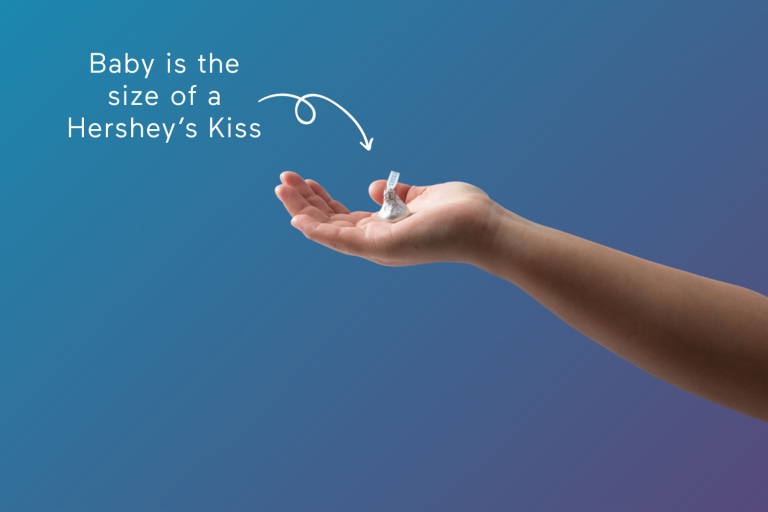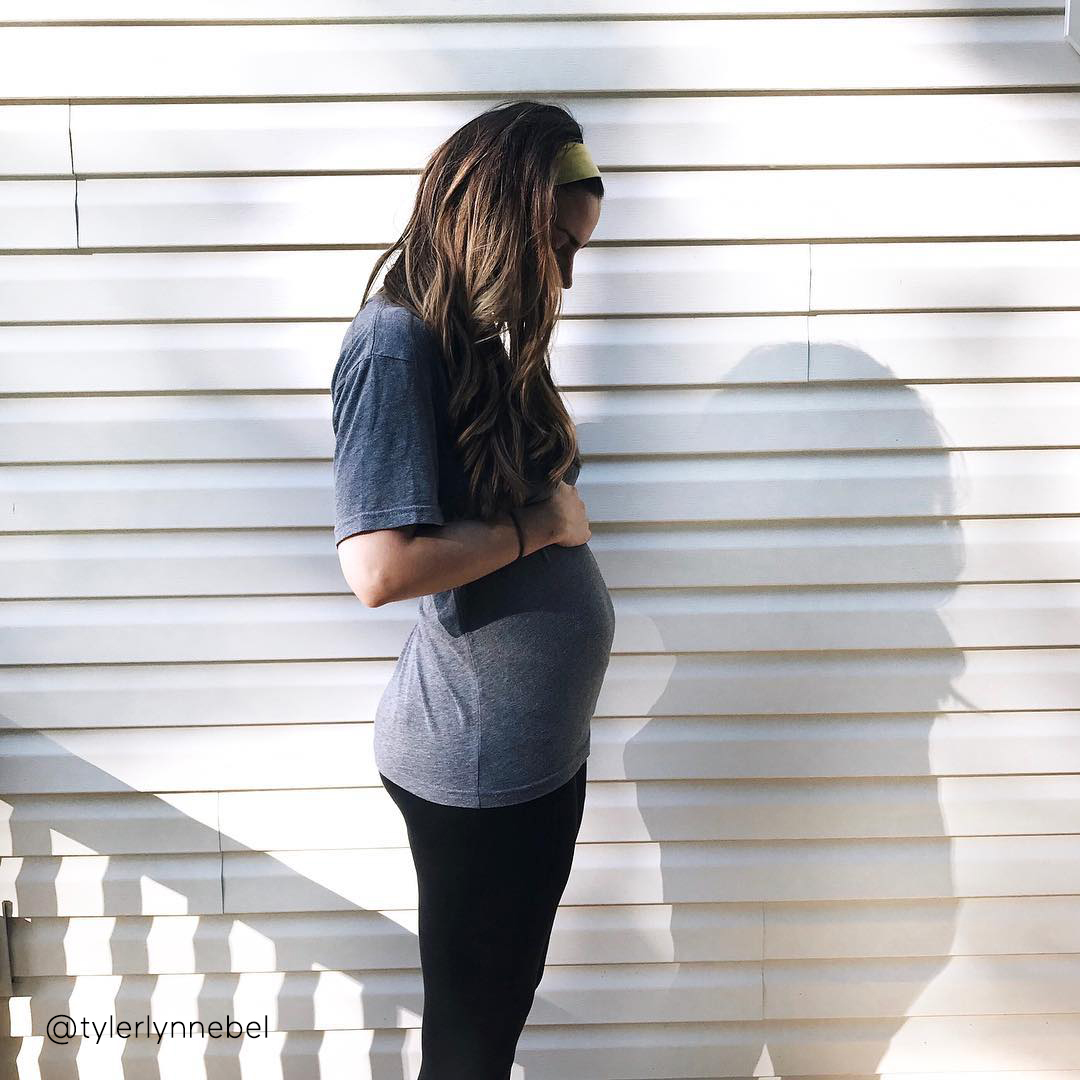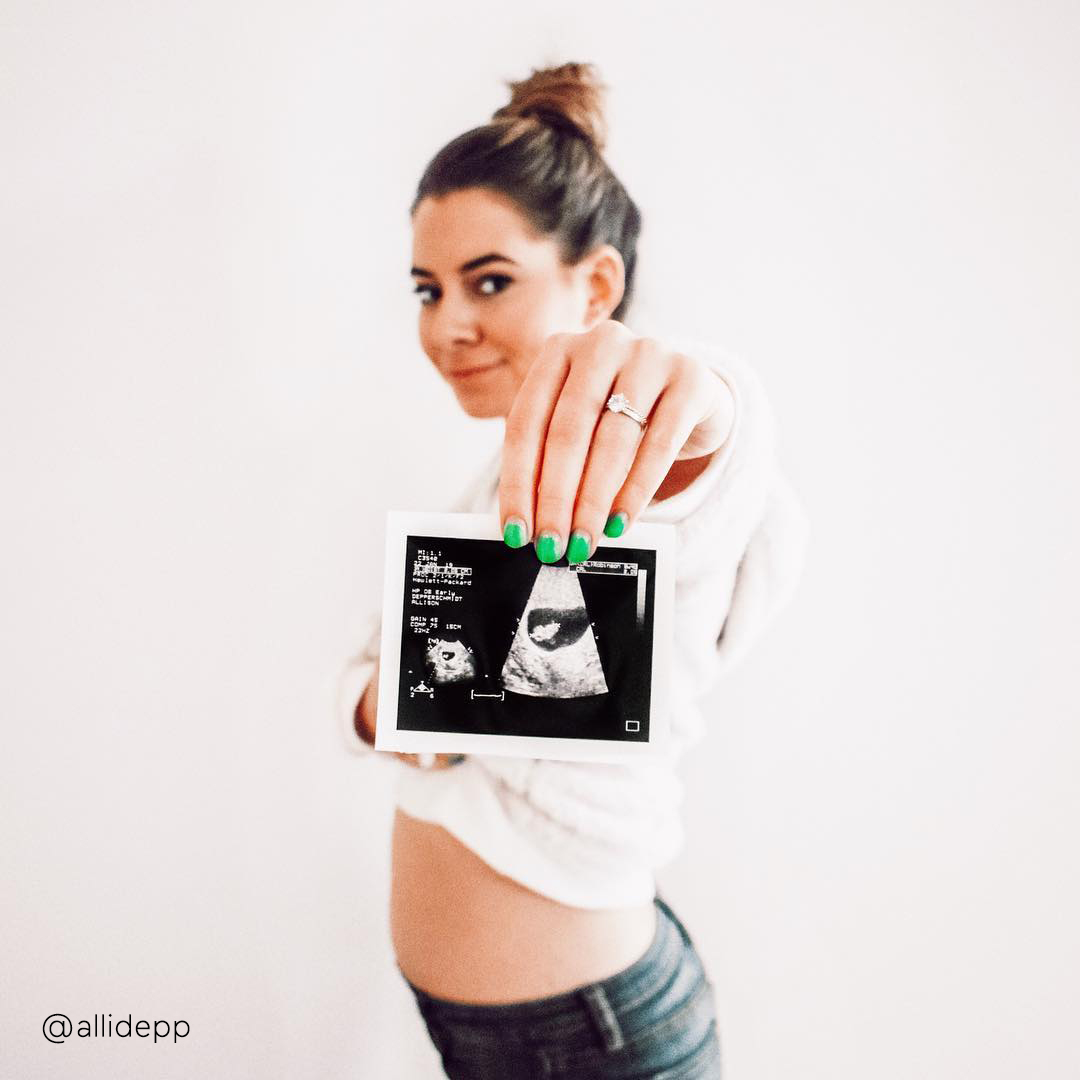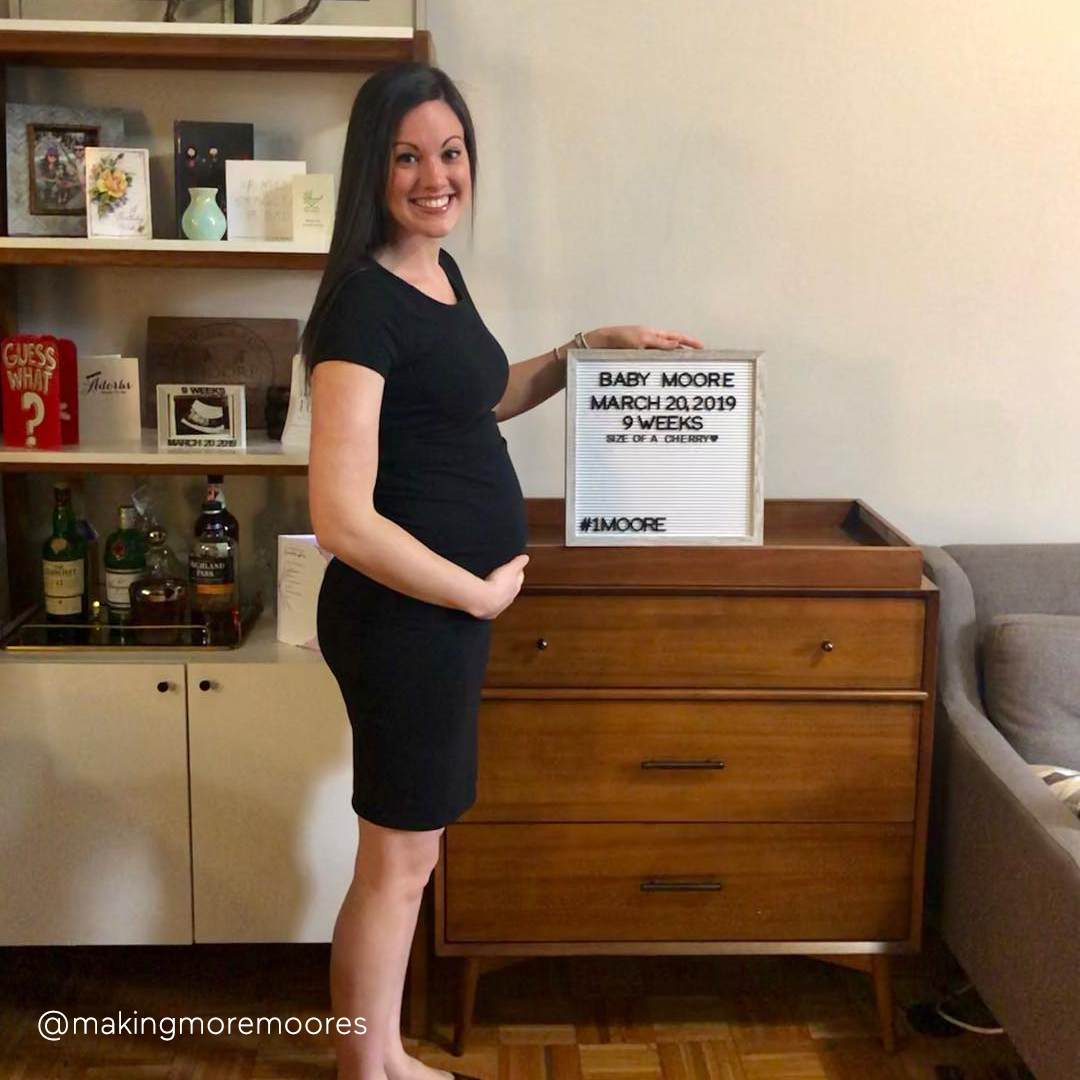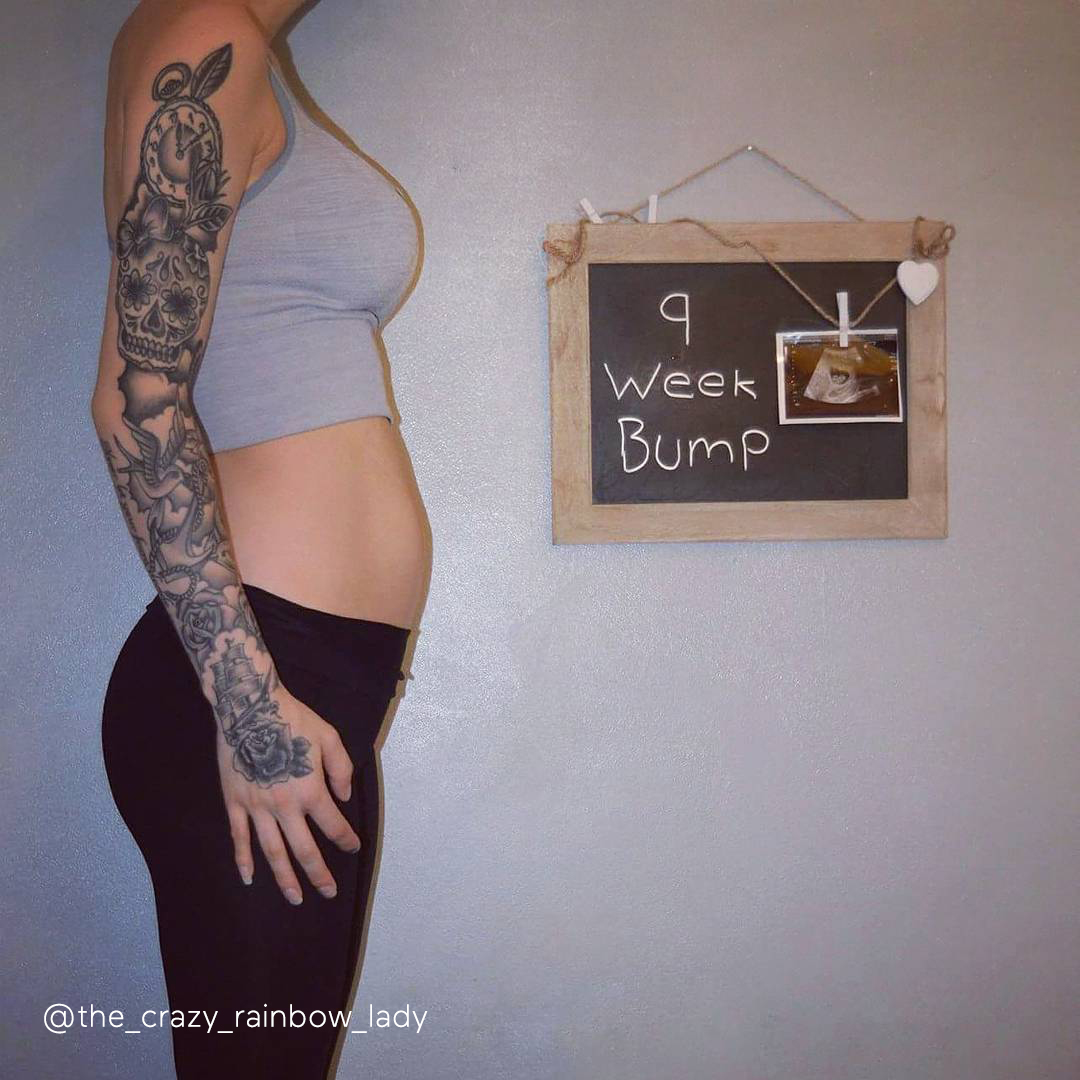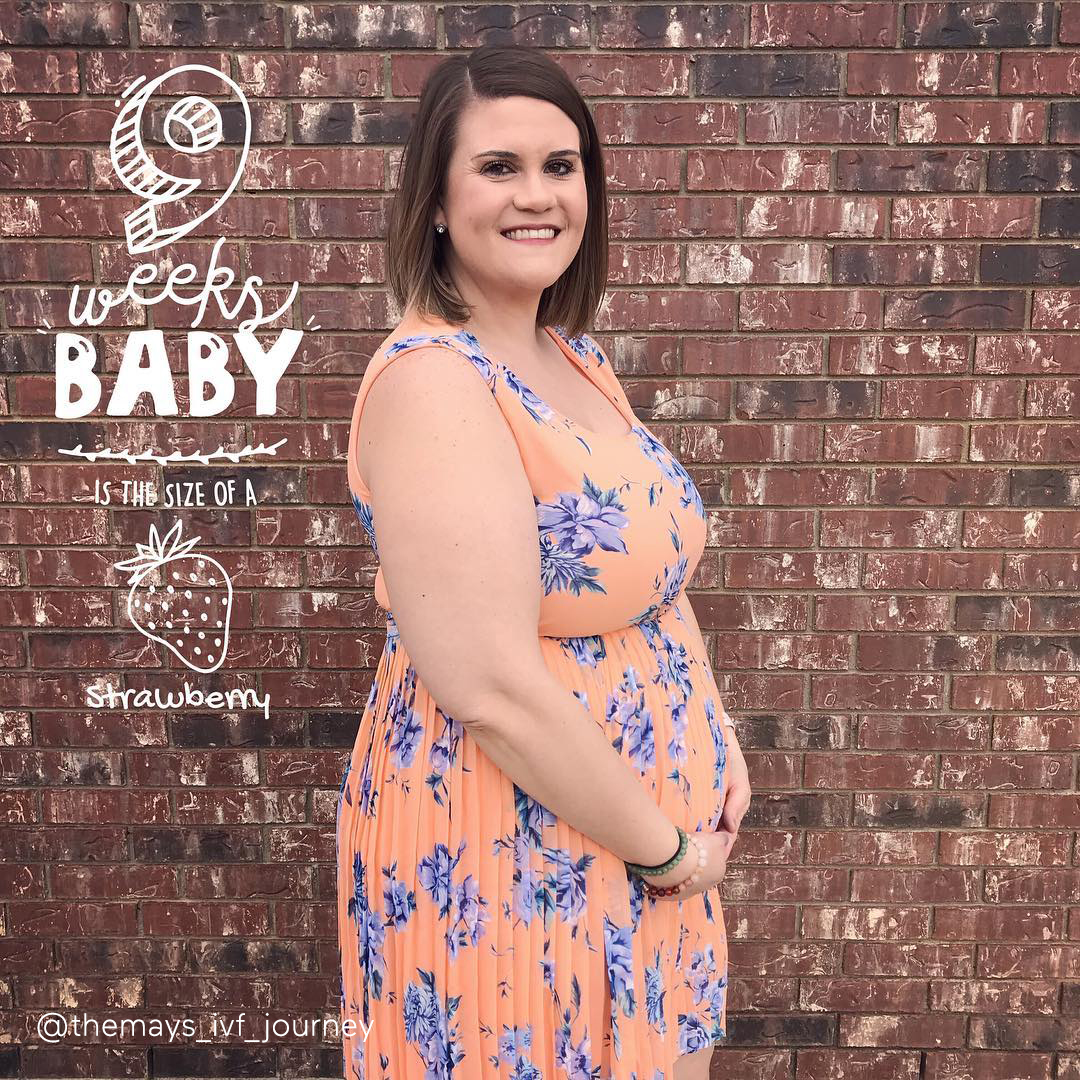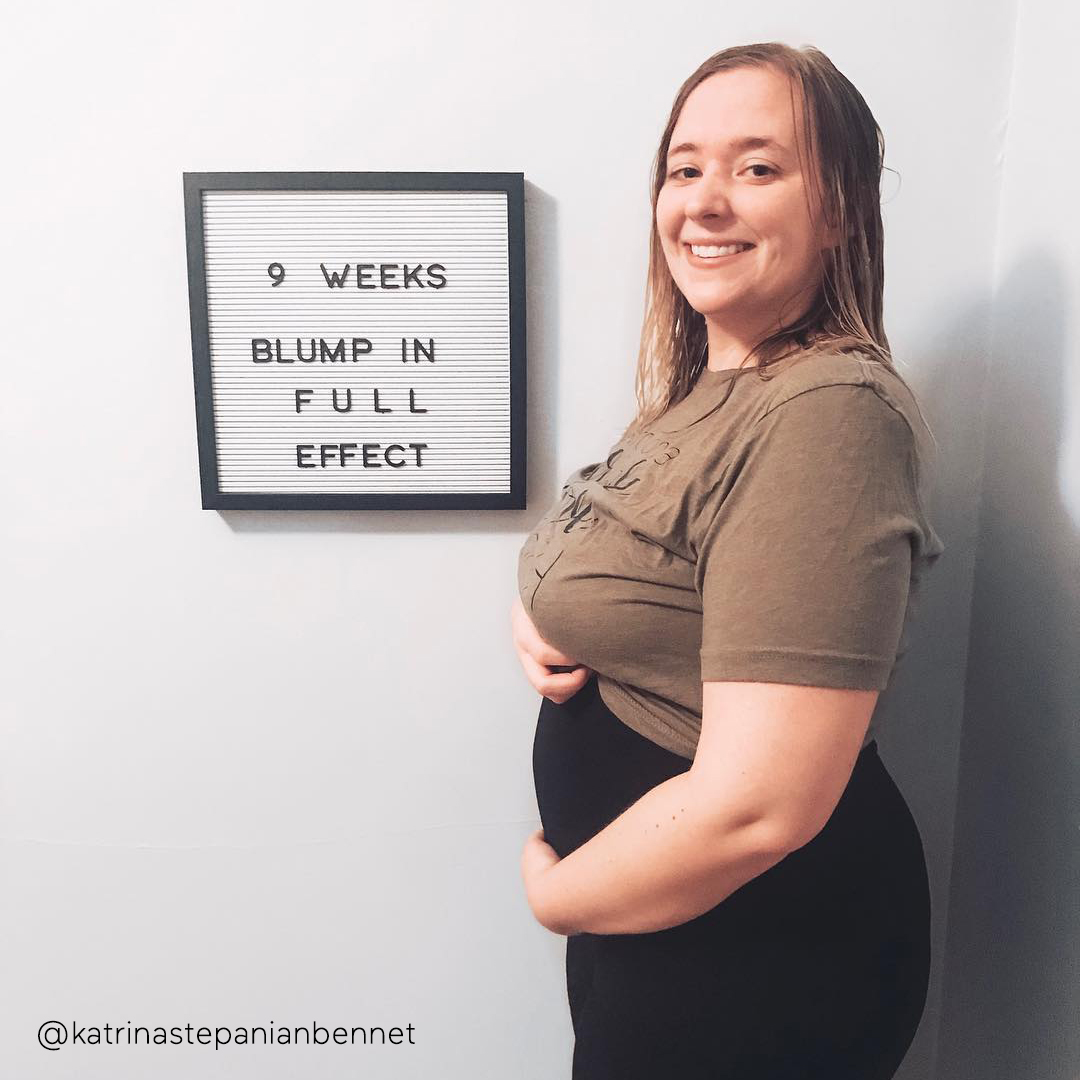9 Weeks Pregnant
At 9 weeks pregnant, you may be experiencing pregnancy headaches and your baby is starting to develop bones.
By Babylist Staff | Medically Reviewed by Dr. Alyssa Dweck
At 9 weeks, your morning sickness may be at an all time high, but the good news this may be the worst of it. Most pregnant people find morning sickness eases off after week 9 of pregnancy. Hang tight! Here’s what else is on the docket at 9 weeks pregnant—and if you haven’t figured out when you can expect your baby, try using our due date calculator.
What To Expect at 9 Weeks Pregnant
How Big is Baby at 9 Weeks?
Your baby is around .91 inches long and weighing in at .07 ounces. That’s about the size a Hershey’s Kiss.
How Many Months Is 9 Weeks Pregnant?
9 weeks pregnant is just over two months pregnant, which is part of the first trimester of pregnancy.
Your Baby at 9 Weeks
Though it might sound like a message from outer space, that whooshing sound coming from the ultrasound machine is actually your baby’s cardiac activity. And if you haven’t heard it yet, you soon will: most fetal heartbeats can be detected between 8 and 12 weeks, though the heart won’t fully form for a few more weeks. Baby is developing rapidly at this point, and here are some of the high points:
- Heart development: Your baby’s heart now has four distinct chambers, and its valves are forming. But that noise you hear on the ultrasound isn’t a heartbeat, according to NBC. It’s actually an electrical pulse translated by the machine.
- Eyes: According to Mayo Clinic, your baby has eyes that are fully formed now, too, but they won’t open for a while. In fact, the lids will stay shut until about 27 weeks.
- Arms and legs: Your baby’s bones and muscles are starting to develop. You can help those bones develop by getting enough calcium and vitamin D. Aim for about 1,000 milligrams (1 gram) of calcium per day to make sure you have enough for your baby without depleting your own supply (which can lead to bone loss). Vitamin D helps your body absorb all that calcium; take about 200 to 400 IUs of it daily. “Severe vitamin D deficiency can cause skeletal issues in the fetus,” warns Dr. Mariam Naqvi, an assistant professor in maternal fetal medicine and obstetrics and gynecology.
- Fingers and toes: Those webbed buds on your baby’s hands and feet are now their fingers and toes, which now appear to look like fingers and toes.
- Weight gain: Baby’s about to undergo major growth. Over the next three weeks, they’ll double in length, and will go from about .07 ounces to .49 ounces. That’s seven times their current weight!
Top Tip for 9 Weeks Pregnant
There are lots of baby essentials, and a viral pregnancy announcement isn’t one of them. Do it your way!
9 Weeks Pregnant Ultrasound
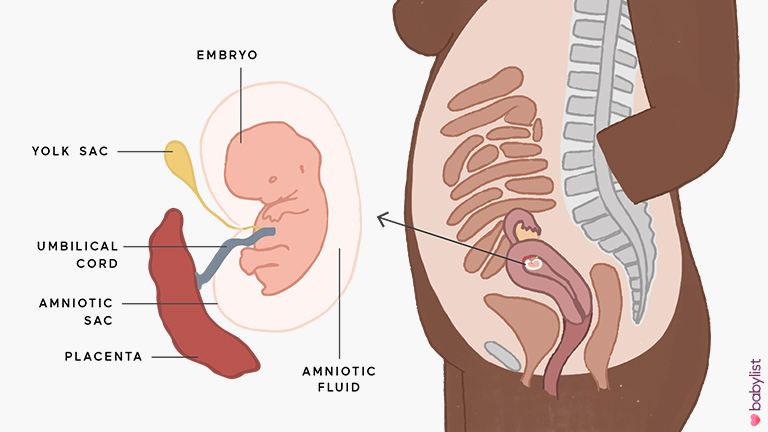
Around this time you’ll probably have your first ultrasound to confirm your pregnancy. Although baby doesn’t quite look like how you may picture a human baby, it’s an exciting milestone that you may want to commemorate.
9 Weeks Pregnant Movement
Your baby may be twitching in utero, but you will not feel it quite yet. Those first flutters are usually felt around 16 weeks.
Your Body at 9 Weeks Pregnant
If you’re 9 weeks pregnant with no symptoms, cross your fingers—you may breeze through without morning sickness. If not, know that the tough times will hopefully pass soon. In the meantime, here are some of the symptoms you may experience during week 9.
9 Weeks Pregnant Symptoms
There’s a strong chance you’re not feeling your best at 9 weeks pregnant. You are probably tired, and you might be dealing with morning sickness. It’s also possible you feel nothing at all. But the following symptoms are pretty typical for this point in your journey. Hang in there!
Morning sickness
Nausea and vomiting can peak around nine weeks. For many, this is the roughest part. But the symptoms should lessen soon, and you’ll hopefully be done early in the second trimester. Keep doing whatever helps your nausea, whether that means constant snacking, sucking on lollipops or mints or sipping lemon sparkling water.
Fatigue
Nodding off in important meetings or while binge-watching Stranger Things? Fatigue is one of the most common symptoms during the first trimester. As your body surges with progesterone, you get sleepy. Take naps, go to bed early and sleep in on the weekends. Just like with morning sickness, do what you need to do to get through.
Cramping
Cramping is usually not a sign of a problem. Cramping at 9 weeks pregnant could be due to dehydration, digestion issues or your uterus expanding. If the cramps are severe or get worse, though, be sure to call your doctor.
Headaches
Pregnancy headaches are common for a variety of reasons, like hormone fluctuations, stress, vision changes, lack of sleep, dehydration and hunger. You can try to prevent them by getting rest, drinking plenty of water, snacking frequently and trying relaxation techniques, like meditation or prenatal yoga. Check with your doc to see what headache medications they approve for you; many give the okay to taking Tylenol for a particularly nagging headache.
Mood swings
Morning sickness can make you moody. So can those pregnancy hormones—some of them are messing with the parts of your brain that normally help you stay calm and collected. If you can, make things easier on yourself—at least for the next couple weeks when moodiness is hitting hard. Reschedule social engagements for the second trimester, ask for help around your home and get extra sleep. (Do you detect a theme here?)
Frequent urination
Running to the bathroom to pee every 20 minutes? Frequent urination is really common during the first trimester because the hormone hcG (the same one that causes nausea) causes extra blood flow and makes your kidneys produce up to 25% more urine than usual. This symptom usually goes away in the second trimester, but it will probably come back when your baby gets big enough to tapdance on your bladder.
“As the uterus grows in size, there may also be compression on the bladder, and thus frequency is common in all trimesters of pregnancy,” says Dr. Naqvi. “Consuming more fluid during the daytime and less in the evenings can help reduce the frequency of overnight voids.”
Weight gain
Doctors usually recommend gaining about 1.1 to 4.4 pounds in the first trimester. If you’re pregnant with twins, you may gain 4 to 6 pounds. But if you’re under or over this metric, don’t freak out. Just talk with your doctor to make sure you’re getting the nutrition you need, especially if you’re having trouble keeping food down.
Pregnancy Symptoms Coming Up In Week 10:
At week 10 of pregnancy, you could be seeing an increase in vaginal discharge, and you may experience nausea or vomiting and constipation.
Commonly Asked Questions About 9 Weeks Pregnant
At nine weeks, your pregnancy is getting real and so are your symptoms. There’s no magic cure (sigh), but these frequently asked questions may help.
How do I keep up with constant cravings?
Keep snacks at the ready—we’re talking in your nightstand, your desk drawer, your purse, your car. Some people swear that avoiding an empty stomach means avoiding feeling sick. Try eating something before you even get out of bed in the a.m. Who cares about the crumbs?
How do I get my jeans to fit?
Pants feeling snug? At 9 weeks pregnant, you may not be ready for maternity pants yet, but if that button on your jeans keeps popping open, pants extenders might just be your new BFF. Super handy, they’ll keep in your regular clothes a few weeks longer.
How much weight should I gain at 9 weeks pregnant?
Doctors usually recommend gaining about 1.1 to 4.4 pounds in the first trimester. If you’re pregnant with twins, you may gain four to six pounds. But if you’re under or over this metric, don’t freak out. Just talk with your doctor to make sure you’re getting the nutrition you need, especially if you’re having trouble keeping food down.
Real Baby Bumps at 9 Weeks Pregnant
9 Weeks Pregnant Checklist
- Make a plan to announce to friends/work/Facebook/Instagram/ your second grade teacher that you’re expecting.
- Pack snack emergency kits and put them where you need them most.
- Clear your calendar of any unnecessary appointments or social engagements over the next few weeks. Give yourself extra time to rest and permission to take extra care of yourself until you’re closer to the second trimester. Chances are you’ll feel more like yourself soon.
Sources
- Mariam Naqvi, MD, Assistant Professor in Maternal Fetal Medicine and Obstetrics and Gynecology, Cedars Sinai Medical Center
- ‘Heartbeat bills’: Is there a fetal heartbeat at six weeks of pregnancy?
- Fetal development: The 1st trimester
- Placenta definition on Merriam-Webster
Babylist Staff
Editor
Babylist editors and writers are parents themselves and have years of experience writing and researching, coming from media outlets like Motherly, the SF Chronicle, the New York Times and the Daily Beast, and the fields of early childhood education and publishing. We research and test hundreds of products, survey real Babylist parents and consult reviews in order to recommend the best products and gear for your growing family.

